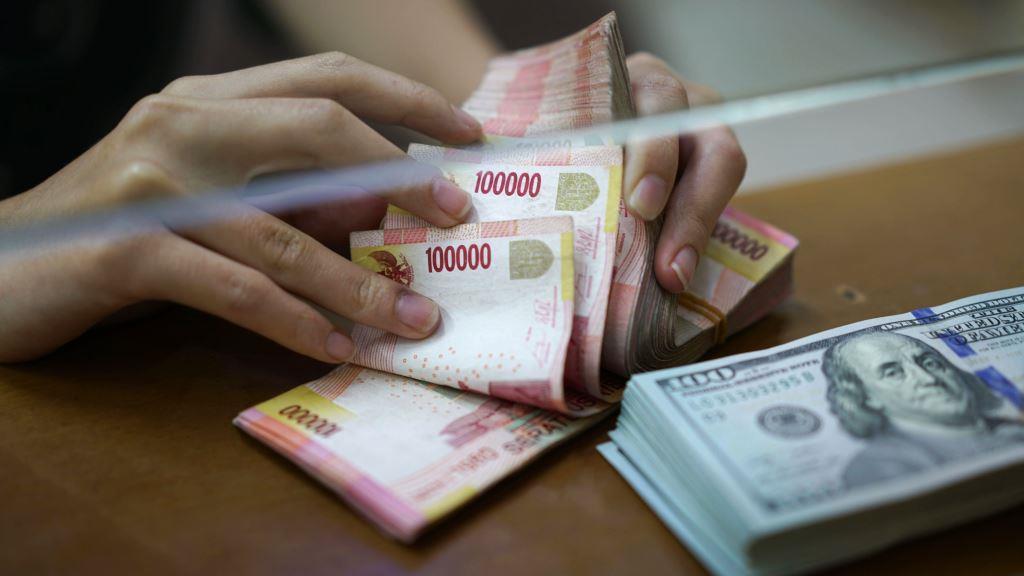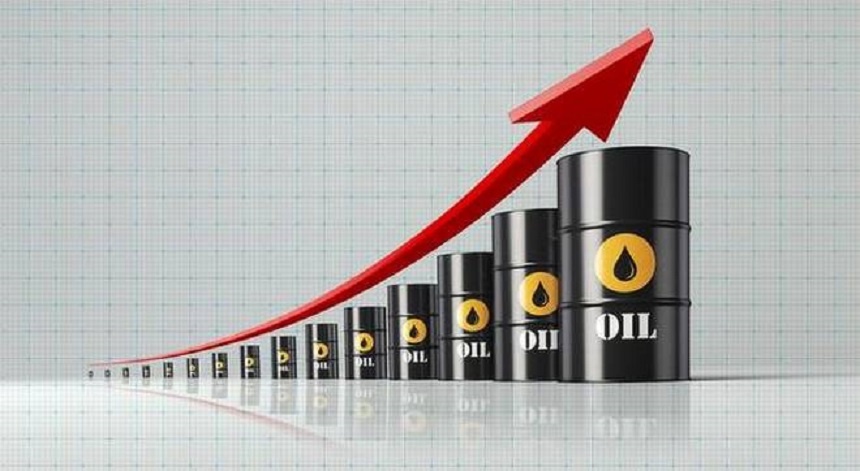Economy
Crude Oil Market Tumbles as Libya Disruption Fears Ease

By Adedapo Adesanya
The crude oil market fell further on Tuesday as concerns over disruption to Libyan oil loadings eased, with Brent futures marginally down by 11 cents or 0.14 per cent to $76.97 per barrel and the US West Texas Intermediate (WTI) futures losing 9 cents or 0.12 per cent to finish at $73.08 per barrel.
In Libya, local protesters prevented crude oil loadings on Tuesday at Es Sider and Ras Lanuf ports, putting about 450,000 barrels per day of exports at risk.
A group called the Oil Crescent Region Movement demanded that the headquarters of five local energy companies be transferred to the western Libyan region that, as the name suggests, is home to most of the country’s oil industry.
However, fears of this supply disruption eased after Libya’s state-run National Oil Corporation (NOC) said export activity was running normally after it held talks with protesters.
Libya’s daily output stands at 1.41 million barrels daily, with condensate production at some 43,700 barrels daily, which puts the combined crude plus condensates output at 1.65 million barrels daily.
Also, fears of weaker demand linked to soft economic data from China and rising temperatures elsewhere pressured prices.
China, the world’s largest crude oil importer, reported on Monday an unexpected contraction in January manufacturing activity.
Official factory survey showed on Monday that China’s manufacturing activity unexpectedly contracted in January, its weakest since August 2024.
The official purchasing managers’ index (PMI) contracted to 49.1 in January from 50.1 in December, below the 50-mark separating growth from contraction.
This development will keep alive calls for stimulus in the world’s second-largest economy.
Market analysts note that US President Donald Trump’s threat to impose a 10 per cent duty on Chinese imports on February 1 to push the country to clamp down on the trafficking of the chemical precursors of fentanyl risks will expose how reliant its economy is on exports for growth.
China’s crude oil demand is also expected to be hit by the latest US sanctions on Russian oil trade, with the refineries in its region of Shandong losing up to 1 million barrels per day of crude supply.
In the US, weather forecasts indicate a warmer temperature which is also weighing on demand for heating fuels after extreme cold sparked a natural gas and diesel rally in prior sessions.
Also weakening prices, the US Dollar index strengthened on Tuesday amid fresh tariff threats from the Trump administration.
President Trump said on Monday he planned to impose tariffs on imported computer chips, pharmaceuticals and steel.
A stronger Dollar also pressured prices by making oil more expensive for holders of other currencies.
Economy
Oil Prices Jump as Trump Revokes Chevron’s Venezuela Licence

By Adedapo Adesanya
Oil prices rose more than 2 per cent on Thursday amid supply concerns after the US President, Mr Donald Trump, revoked a licence granted to US oil major, Chevron, to operate in Venezuela.
The news led Brent crude oil futures to spike by $1.53 or 2.1 per cent to $74.06 a barrel while the US West Texas Intermediate (WTI) crude oil futures increased by $1.64 or 2.4 per cent to $70.26.
The Chevron licence revocation means the company will no longer be able to export Venezuelan crude.
However, if Venezuelan state oil company, PDVSA, exports oil previously exported by Chevron, US refineries will be unable to buy it because of U.S. sanctions.
President Trump said this was due to the lack of electoral reform in the South American country alongside with insufficient action on migration.
Chevron has been exporting around 240,000 barrels of Venezuelan crude to the US daily after former US President Joe Biden granted them a waiver.
The amount constitutes around 25 per cent of the country’s total oil production and generates substantial revenues that stay in the Venezuelan economy.
Meanwhile, market analysts noted that the move could also lead to the negotiation of a fresh agreement between the Chevron and PDVSA to export crude to destinations other than the US.
This development could also impact the Organisation of the Petroleum Exporting Countries and its allies, OPEC+, to which Venezuela is a member.
Chevron’s exit could reduce Venezuela oil’s production, giving OPEC+ capacity to increase output.
However, investors were still keeping an eye on signs of a potential peace deal in Ukraine, which could result in higher Russian oil flows.
President Trump said Ukrainian President Volodymyr Zelenskiy will visit the US on Friday to sign an agreement on rare earth minerals.
However, the Ukrainian leader said the success of talks would hinge on continued US aid.
The market was pressured by news that US economic growth slowed in the fourth quarter amid cold weather and concerns that tariffs will hurt spending through higher prices.
Economy
NASD Exchange Closes Flat Despite Posting Six Price Movers

By Adedapo Adesanya
The NASD Over-the-Counter (OTC) Securities Exchange closed flat on Wednesday, February 26 with the Unlisted Security Index (NSI) static at 3,268.81 points and the market capitalization unchanged at N1.851 trillion.
The alternative stock exchange closed flat at midweek despite recording six price movers, with two in the green region and four in the red territory.
On the gainers’ side Afriland Properties Plc and FrieslandCampina Wamco Nigeria Plc, with the former rising by N1.12 to N22.80 per unit from the preceding day’s N21.68 per unit and the latter expanding by 76 Kobo to settle at N39.86 per share compared with Tuesday’s closing price of N39.10 per share.
However, First Trust Microfinance Bank Plc lost 5 kobo to close at 47 Kobo per unit compared with the previous day’s 52 Kobo per unit, Geo Fluids dropped 34 Kobo to settle at N3.58 per share versus the preceding session’s N3.24 per share, UBN Property Plc went down by 10 Kobo to finish at N1.75 per unit, in contrast to Tuesday’s closing price of N1.85 per unit, and Central Securities Clearing System (CSCS) Plc declined by 14 Kobo to close at N22.01 per share versus N22.15 per share.
During yesterday’s session, the volume of securities transacted by investors jumped by 99.3 per cent to 1.2 million units from the 605,399 units transacted in the previous trading day.
However, the value of transactions slid by 28.5 per cent to N10.6 million from N14.8 million, while the number of deals went up by 58.3 per cent to 38 deals from 24 deals recorded on Tuesday.
At the close of business, Impresit Bakolori Plc was the most active stock by value (year-to-date) with 533.8 million units worth N520.9 million, followed by Afriland Properties Plc with 16.4 million units valued at 335.2 million, and FrieslandCampina Wamco Nigeria Plc with 8.3 million units valued at N329.2 million.
Industrial and General Insurance (IGI) Plc ended the most active stock by volume on a year-to-date basis with 69.7 million units worth N23.6 million, trailed by Geo-Fluids Plc with 10.9 million units sold for N51.9 million, and FrieslandCampina Wamco Nigeria Plc with 8.3 million units valued at N329.2 million.
Economy
Naira Remains Unchanged at N1,501/$1 at Official FX Market

By Adedapo Adesanya
The Naira closed flat on the US Dollar at the Nigerian Autonomous Foreign Exchange Market (NAFEM) on Wednesday, February 26 at N1,501.95/$1.
Also, the value of the local currency against the Pound Sterling and the Euro remained unchanged in the official market during the session at N1,894.72/£1 and N1,570.11/€1 apiece.
However, the Nigerian currency depreciated against the United States currency by N10 at midweek to quote at N1,500/$1, in contrast to the preceding day’s N1,490/$1.
The outcome of the local currency comes amid ease in the wider economy and recent moves like clearing backlogs, which have led to the country’s foreign reserves losing over $2 billion in the last month.
However, market analysts fear that the continued drop in the foreign reserves may only offer temporary respite to the Naira.
In the cryptocurrency market, most of the tokens fell on Wednesday after the US President, Mr Donald Trump, said he plans to impose a 25 per cent tariff on the European Union (EU) during his first cabinet meeting.
The price of Bitcoin (BTC) depreciated by more than 3 per cent in the last 24 hours to close at $85,878.47.
After the recent market selloff, there were calls that the drop might have been the bottom but Mr Trump’s EU tariff plans seem to have dampened market optimism.
The American President claimed that the 27-member union does not accept US cars and farm products while the US buys from the bloc.
On its part, the EU said it will react firmly and immediately against “unjustified barriers to free and fair trade”
Ethereum (ETH) slumped by 5.9 per cent to $2,341.69, Ripple (XRP) went down by 3.7 per cent to $2.20, Cardano (ADA) fell by 2.9 per cent to trade at $0.6625, Dogecoin (DOGE) depreciated by 1.3 per cent to $0.2076, Binance Coin (BNB) weakened by 1.2 per cent to $614.13, and Solana (SOL) declined by 1.0 per cent to $140.03.
But Litecoin (LTC) recorded a 6.9 per cent appreciation to quote at $126.46, while the US Dollar Tether (USDT) and the US Dollar Coin (USDC) closed flat at $1.00 each.
-

 Feature/OPED5 years ago
Feature/OPED5 years agoDavos was Different this year
-
Travel/Tourism9 years ago
Lagos Seals Western Lodge Hotel In Ikorodu
-

 Showbiz2 years ago
Showbiz2 years agoEstranged Lover Releases Videos of Empress Njamah Bathing
-

 Banking7 years ago
Banking7 years agoSort Codes of GTBank Branches in Nigeria
-

 Economy2 years ago
Economy2 years agoSubsidy Removal: CNG at N130 Per Litre Cheaper Than Petrol—IPMAN
-

 Banking2 years ago
Banking2 years agoFirst Bank Announces Planned Downtime
-

 Sports2 years ago
Sports2 years agoHighest Paid Nigerian Footballer – How Much Do Nigerian Footballers Earn
-

 Technology4 years ago
Technology4 years agoHow To Link Your MTN, Airtel, Glo, 9mobile Lines to NIN

















